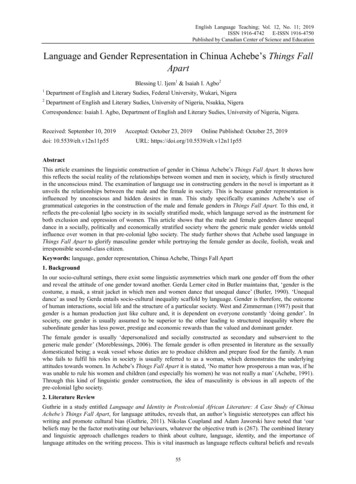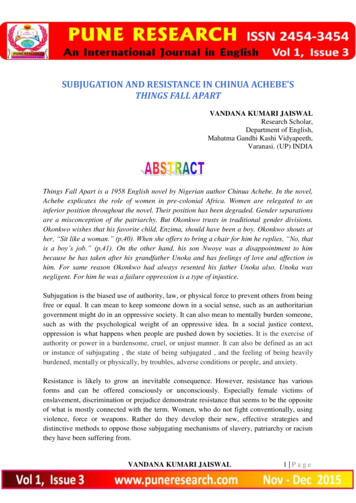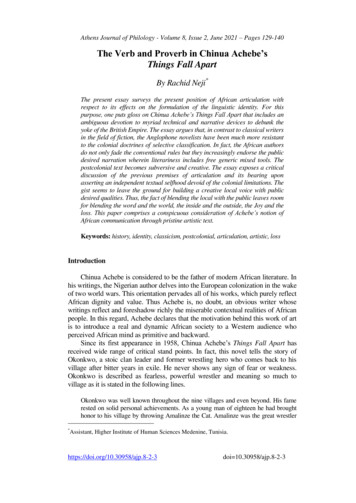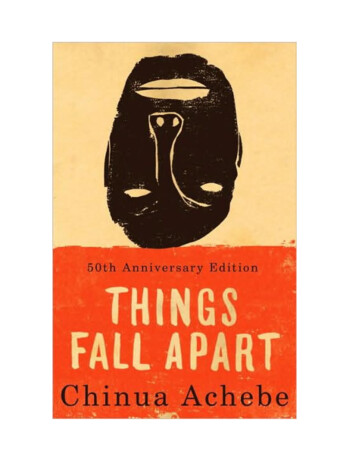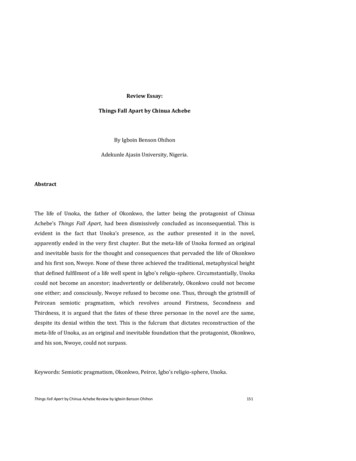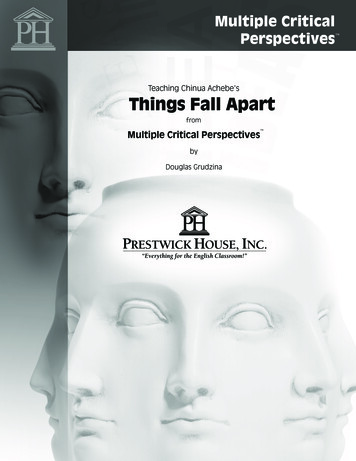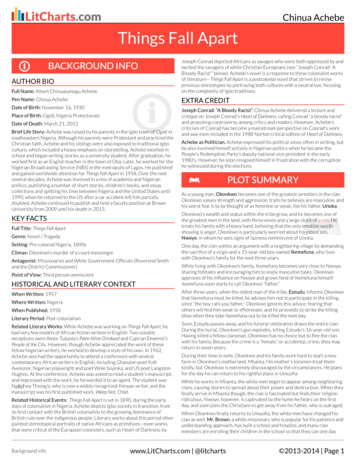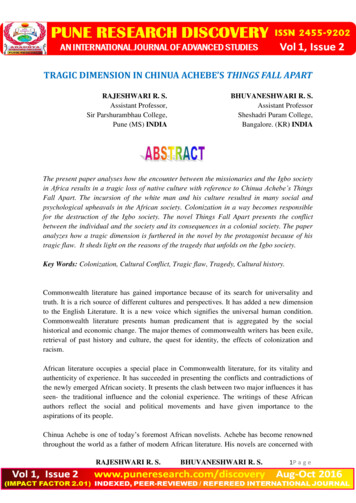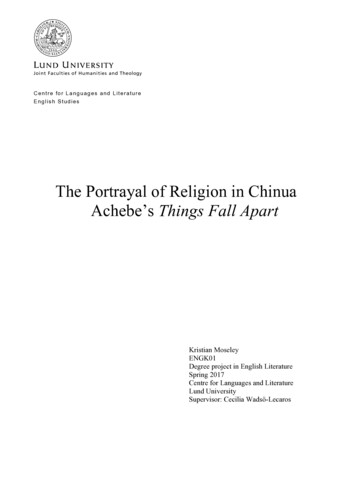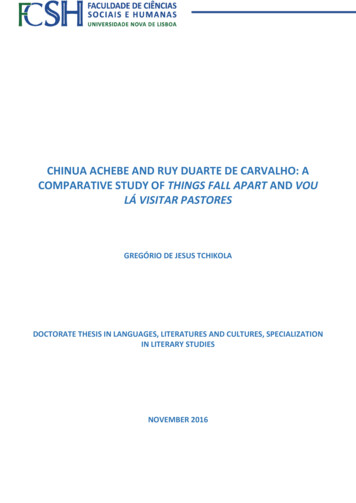
Transcription
CHINUA ACHEBE AND RUY DUARTE DE CARVALHO: ACOMPARATIVE STUDY OF THINGS FALL APART AND VOULÁ VISITAR PASTORESGREGÓRIO DE JESUS TCHIKOLADOCTORATE THESIS IN LANGUAGES, LITERATURES AND CULTURES, SPECIALIZATIONIN LITERARY STUDIESNOVEMBER 20161
CHINUA ACHEBE AND RUY DUARTE DE CARVALHO: ACOMPARATIVE STUDY OF THINGS FALL APART AND VOULÁ VISITAR PASTORESGREGÓRIO DE JESUS TCHIKOLADOCTORATE THESIS IN LANGUAGES, LITERATURES AND CULTURES, SPECIALIZATIONIN LITERARY STUDIESNOVEMBER 20162
This Thesis is presented for the fulfilment of the necessary requirements to obtain the DoctorateDegree in Languages, Literatures and Cultures, Specialization in Literary Studies under the AcademicSupervision of Professor Ana Maria Mão de Ferro Martinho Carver Gale.3
DECLARAÇÕESDeclaro que esta tese é o resultado da minha investigação pessoal e independente. O seuconteúdo é original e todas as fontes consultadas estão devidamente mencionadas no texto, nas notase na bibliografia.O candidato,Lisboa, . de . de .Declaro que esta tese se encontra em condições de ser apreciada pelo júri a designar.O(A) orientador(a),Lisboa, . de . de .4
Do not ignore the talk of the wise ,From them you will learn how to think,And the art of the timely answer (Ecclesiasticus 8, 8-12)5
AbstractCHINUA ACHEBE AND RUY DUARTE DE CARVALHO: A COMPARATIVE STUDYOF THINGS FALL APART AND VOU LÁ VISITAR PASTORESThe comparative study of African literatures in Portuguese and in English languages has notbeen the object of many research projects in Africa.My work is centred in this field of study and it aims at conducting a comparative analysis ofthe narratives produced by Nigerian author Chinua Achebe and Angolan author Ruy Duarte deCarvalho, observing the convergent and divergent aspects in aesthetics and ideology present in theirworks. The corpus under analysis includes Things Fall Apart by Chinua Achebe and Vou lá VisitarPastores by Ruy Duarte de Carvalho.The authors converge ideologically in their works as they pay attention to issues such as landownership and usage, peoples’ heritage and history. Besides the historical and cultural diversity,these texts also allow the discussion of other issues, notably particularities in aesthetic elaboration.Both novelists combine literary and anthropological topics. Thus, this thesis is a correlational,descriptive and analytical type of research, and is seeking cultural meaning and understandingthrough fiction.The main sources for my thesis were the two texts mentioned above, but also documentsavailable on African literature, history, literary criticism, ethnography, politics and anthropology.Key words: Literature, Angola, Nigeria, Kuvale, Igbo, Ethnography and Representation.6
AcknowledgmentsI owe this dissertation to the fabulous support of my family, friends, teachers and sponsoringinstitutions.Funding for this research came in the form of generous fellowship from the FCSH/NOVA (TheNew University of Lisbon), the Instituto Superior de Ciências da Educação (Agostinho Neto Universityand José Eduardo dos Santos University), and friends.I would also like to acknowledge the FCSH (The New University of Lisbon) for the significantinstitutional and academic support I received. Without it, this dissertation would simply beimpossible under my conditions of foreign student and working in Angola. I have been the beneficiaryof the best instruction a young scholar could hope to receive.In particular, I would like to express my gratitude to Professor Ana Maria Martinho, ProfessorNuno Júdice, Professor Teresa Almeida, Professor Rui Zink, Professor Carlos Ceia, Professor Maria doRosário Pimentel, Professor Gustavo Rubim who were my mentors in the Doctorate studies at FCSH(New University of Lisbon) and have given of their time and intellect.Professor Ana Maria Martinho’s wisdom and supervision, patient mentorship and intellectualcapacity have been a constant blessing throughout my studies. The excellence of her scholarship isunparalleled and I am tremendously grateful to have been her student. Early conversations withProfessor Nuno Júdice and Professor Rui Zink were also fundamental in setting me on the right trackat the outset of my research. At the New University of Lisbon, the library’s collegiality and generosityhelped me to turn that advice into the work that now forms the core of this dissertation. Throughoutmy studies, Professor Rui Zink has been a fountain of wisdom. As it has for so many other scholars,Professor Zink’s work has taught me how to read literature and scientific methodology and hisscholarship represents a standard of excellence worth aspiring to.Without the support and intellectual challenges of Professor Arsénio Cruz, my skills and mycareer would be much diminished. I am tremendously thankful to count on him as a counsellor anda very close friend.My time at FCSH/NOVA (The New University of Lisbon) has been spent in the company ofextraordinary friends and extraordinarily gifted classmates. In particular, I would like to thank PralonBoonrussamee, Sara Laisse, Alexandre Sakukuma and Patricia Neves for their companionship,support and advice.7
While at the Kimmage and Milltown Institutes in the Republic of Ireland from 2000 to 2005, Iwas lucky to have had a group of colleagues and teachers including Professor Thomas Whelan,Professor Martin Kelly, Professor Paddy Roe, Professor Tony Ghegan and Mary Barron (MSc). Maryalso read my work carefully and provided important advice on how to write and translate my ideascorrectly in the English language.Also, In particular, I would like to thank Professor Miranda Lopes Miguel and Professor MárioRodrigues from the Instituto Superior de Ciências da Educação, who have been marvellous andgenerous directors, colleagues and friends. Without them, the financial support and encouragementfor my trips and accommodations in Lisbon would not have been possible.My parents, Marcial Chicola and Albertina Natopi, my mother-in-law, Julia, my sisters-in-law,Dalia, Lalita and Chinha, and brothers-in-law, Sérgio and Dudu have all waited patiently to see thiswork come to its completion. I am glad, at last, to be able to share it with them.I am also thankful that its completion will afford me more time to spend with my brothersHorácio, Mingo, Dadi, and Didi, and my sisters Yana, Fifi and Bia.Particular thanks are owed to my wife Genoveva Tchikola, who came into my life two yearsbefore the beginning of this research and who has endured both my peregrinations and its slowprogress. Gege has been a stimulus when I needed one, and has offered comfort and reassurancewhen I needed them. I am fortunate beyond measure to have her as a partner, and I am proud of thescholar she is becoming.One of the great pains of academic work is the way its persistent focus can keep us distantfrom those we love most. My wife Genoveva, my daughters Agnes and Isis, and my son Cristianowere very patient with me every time I had to travel to Lisbon for studies or research during thosefour years. This dissertation is also theirs. I love them all and I ask them for pardon for often beingaway from home for studies. I know they understand, and hope they have already forgiven me forthat.During the war of 1993 in Huambo, Angola, my family lost our beloved sister Gizela, who wasonly seven years old. Everybody loved her so much. Her death touched us all. We still miss herterribly.This dissertation is dedicated to her memory.8
Table of ContentsAbstract . 6Acknowledgments . 7Table of Contents . 9Chapter I: General Introduction . 12Chapter II: Ethnography and Literature. 182. 1. Introduction . 182. 2. General Theoretical Review about Key Concepts . 252. 2. 1. Literary Theory, Literature and Literary Criticism . 252. 2. 2. Ethnography and Fiction. 352. 2. 3. Social Construction and Representation . 412. 3. Africa: Major African Literatures and Ethnographic works . 462. 3. 1. Nigeria: Literary Writers . 722. 3. 2. Angola: Literary Writers and Ethnographers . 78Chapter III: Chinua Achebe . 943. 1. Introduction . 943. 2. Biographical Notes . 943. 3. Achebe’s Relevant Works . 983. 4. Position in the Nigerian Literary Canon . 1043. 5. Things Fall Apart . 1073. 5. 1. Historical and Literary Contexts. 1083. 5. 2. Plot and Themes . 110Chapter IV: Ruy Duarte De Carvalho . 1134. 1. Introduction . 1134. 2. Biographical Notes . 1134. 3. Ruy Duarte de Carvalho’s Literary Works . 1194. 4. Position in the Angolan Literary Canon . 1234. 5. Vou lá Visitar Pastores . 1294. 5. 1. Historical and Literary Contexts. 1294. 5. 2. “Plots” and Themes . 131Chapter V: Comparative Approach to both Cultures and Peoples: Igbo and Kuvale . 1355. 1. Introduction . 1359
5. 2. Kuvale s and Igbo’s social ethos/representations under perspective: (de) constructing Myths, (re)constructing linguistic and cultural identities . 1365. 2. 1. The Kuvale World: land, language, culture and social practices . 1375. 2. 2. The Igbo World: land, language, culture and social practices . 1525. 3. Unveiling cultural encodings: Yam and Cow . 1605. 3. 1. The Symbolism of Yam for Igbo People . 1615. 3. 2. The Symbolism of Cows for Kuvale People. 1635. 4. Reviewing post-colonial imperialism, discourse and cultural hegemony . 171Chapter VI: Comparative Approach to the Works under Analysis . 1846. 1. Introduction . 1846. 2. Theoretical, Ideological and Aesthetical Aspects. . 1846. 2. 1. Things Fall Apart: Making Sense of it . 1846. 2. 1. 1. Narrative strategies, literary styles and interpretation . 1896. 2. 1. 2. Rhythm and Orality . 1996. 2. 1. 3. Metaphorical and proverbial references . 2106. 2. 2. Vou lá Visitar Pastores: Making Sense of it . 2136. 2. 2. 1. Enunciative and Narrative Strategies . 2156. 2. 2. 2. Literary Resource and Style . 2216. 2. 2. 3. Thematic and Structural Representations . 2296. 3. Ethnographic and Cultural Convergences and Divergences . 2336. 4. Literary Convergences and Divergences. 2476. 5. Readership and theoretical implications of both works in African literature and the national canons. 251Chapter VII: General Conclusion . 2577. 1. Recommendations and prospective research . 265VIII: Bibliography . 2668. 1. Achebe’s Books . 2668. 2. Publications about Achebe’s writings. 2678. 3. Ruy Duarte de Carvalho’s Books. 2718. 4. Publications about Ruy Duarte de Carvalho’s writings . 2728. 5. On African Literature(s) and Theory . 2738. 6. Theory, Language, Culture and Literature . 2838. 7. Web Links. 287IX: Glossary . 29110
X: Annexes . 29310. 1. The Photos of the Authors and the works studied . 29310. 2. The Map of Kuvale Land and a photo of Kuvale people. . 29410. 3. The Map of Igboland, photos of its people and some customs. . 29611
Chapter I: General IntroductionThis thesis has its inception in the identification and discussion of crucial problems withinAfrican countries such as cultural heritage (tradition) and modernity, especially among the Igbo(Nigerian) and Kuvale (Angolan).The reading of the forms the authors Chinua Achebe and Ruy Duarte de Carvalho use toexpand on this reality is a condition sine qua non to define our central premises. The strongdescriptive emphasis and the complex network of cultural meanings found both in Things Fall Apartand Vou lá Visitar Pastores further support the relevance of a comparative approach.I will search for the complex meanings in the narratives that better frame their proposedtopics, and explore hypotheses about the constitution of Nigerian and Angolan identities. Bothauthors under analysis question the limits of objectivity, the limits of impartiality in the collection ofdata about their nations and the limitations of scientific methodology in fieldwork. On their part, theycombine and proprose anthropology and literature as potential analytical tools.Achebe and Carvalho also use uncommon linguistic tools not only to season their style, butalso to make it more consequent to the tasks they have set up as far as cultural discussion andportrayal are concerned. I observe that the themes chosen by the authors impact the structure oftheir texts and are supported by discourses and languages that go beyond the conventionaldocumental perspective. As I see it, these texts highlight the realities characterized by linguisticplurality of the communities they address.From my readings of these books, I perceive the potential of taking further the theoreticaldiscussion between literature and anthropology, and between ethnography and fiction, which, in myopinion, can help restore African ethnography in general, and in particular that of Nigeria and ofAngola.Departing from this point, my work further focuses on a comparative analysis of the abovementioned narratives, observing notably the convergent and divergent aspects in aesthetic andideological terms that they offer. I also look at the social and cultural representations of the people(Igbo and Kuvale), as described by the authors.12
I present hereby the research design of the thesis which focuses on a leading question and onits sub-questions, and which have served as a guideline for the writing of the thesis itself. Theobjectives of the thesis, the hypotheses raised and the results to be expected are outlined as well.To situate my research topic historically and theoretically, a literature review on issuesconcerning literary criticism, ethnography, fiction, social construction and representation, Africanliterature in general, and Nigerian and Angolan literary works in particular, will be conducted inchapter II. In chapters III and IV, I will focus on Chinua Achebe and Ruy Duarte de Carvalhorespectively, by making reference to biographical notes, the position they occupy nationally in theirrespective literary canons. Historical and literary synopses of the books under analysis will also bepresented.Chapter V will deal with the comparative approach to both cultures and peoples (Kuvale andIgbo), by paying attention to their linguistic and cultural identities, social constructions andrepresentations. It will also unveil cultural encodings such as Yam and Cow and review post-colonialimperialism, discourse and cultural hegemony as an attempt to understand pre and postindependence textualities especially in Africa.Chapter VI will compare the texts under analysis from theoretical, ideological and aestheticalperspectives, by assessing readership and theoretical implications of both books in African literatureand the national canons at stake and by, fundamentally, observing the ethnographic and literaryconvergences and divergences of both texts. These two chapters, V and VI, will constitute the coreof the thesis.Chapter VII will be my general conclusion where I will summarize and indicate the crucialfindings of this research and make recommendations for future investigations in the same field.Finally, chapter VIII will present the bibliography, followed by a glossary and annexes.Thus, this methodological framework is designed from a grounded theoretical perspective,1which has provided a body of texts for the research and planning of the thesis. A variety ofdifferentiated epistemologies, what I would call substantive theories – that is, theories generatedwithin particular fields of research or disciplines – has also been used to evaluate and understand1See Kathy Charmaz, Constructing Grounded Theory: a practical guide through qualitative analysis, London: SagePublications, 2006.13
possible theories that these two texts, i.e., Things Fall Apart and Vou lá Visitar Pastores, generate, inorder to establish comparative grounds and provide potential theoretical dissemination.I characterize both Achebe’s and Duarte’s texts as fictional ethnographies and also asethically, politically and socially relevant documents, therefore theoretically justifiable for academicwork. I want to stress the importance of revisiting and understanding these two texts under a broadset of scientific and analytical perspectives.Such an approach will allow me to understand the objective and subjective realities expressedand suggested in the texts. As an example, I can mention the issue of the westernization of Africanreality, implicitly found in Achebe’s Things fall Apart. The author shows how this has changed thehuman and physical configurations of the African continent and how this has urged the study of theAfrican world in transition and in the move.Contemporary ethnography, also referred to by some as a form of anthropology, viewsqualitative writings as socially constructed texts and, therefore, it tries to deconstruct hiddenimperatives in the use of authority, voice and style as some researchers have appropriately pointedout.This observation stresses the role the new anthropology must play to reconcile theboundaries between the social sciences and humanities in order to critically examine literature andethnography as form of socially engaged textualities. Following this perspective, I want to assignunequivocal relevance to African texts that in the past were often seen by some social theorists astheoretically insignificant.For this reason, this thesis is a correlational, descriptive and analytical type of research,seeking meaning and understanding through fiction. It draws on literary criticism from classical tocontemporary theorists by studying and interpreting these literatures. The method to be followedwill include a review of documents and comparative text analysis of Things Fall Apart and Vou láVisitar Pastores.Starting this research, I turned initially for guidance to van Maanen s hermeneuticphenomenology, which is essentially a research and writing methodology for investigation, and toPaul Ricoeur’s. This was crucial for me, because phenomenological understanding as such isexistential; it relates to impressions of how phenomena are experienced. Hermeneutics is the14
interpretation of textualities resulting from a specific situation (or experience), where texts can bespoken or written, and can include gestures and actions. As Ricoeur put it,Une manière radicale de mettre en question le primat de la subjectivité est de prendrepour axe herméneutique la théorie du texte. Dans la mesure à l’intention subjetive deson auteur, la question essentialle n’est pas de retrouver, derrière le texte, l’intentionperdue, mais de déployer, devant le texte, le «monde » qu’il ouvre et découvre.Autrement dit, la tâche herméneutique est de discerner la chose du text (Gadamer) etnon la psychologie de l’auteur. La chose du texte est à sa structure ce que, dans laproposition, la référence est au sense (Frege)2Ricoeur claims here that hermeneutics is a radical method used to meditate upon the text perse in order to find a meaningful theory that can explain it as well as define the worlds or experiencesdescribed in it. It appears to me that, for Ricoeur, hermeneutics is a theory for discovering newmeanings through the interpretation of texts. As I see it, it can also be applied to the interpretationof literary forms and cultural phenomena described in Things Fall Apart and Vou lá Visitar Pastoressince both of them report experiences of self and other in multiple contexts.Overall, this is a process through which my understanding of theory and method will evolveas I apply them. Thus, the research questions which narrow down my methodological framework arepresented as follows.This thesis is focused on finding out the convergent and divergent aspects in aesthetic andideological terms in Achebe’s and Ruy Duarte de Carvalho’s texts.It is also fed by eight other sub questions which will help narrow this research. Thus, itdiscusses: the extent to which these texts are important in the Nigerian and Angolan canons; thetheoretical frameworks that justify a critical study of these two texts; the way Igbo and Kuvalepeoples represent themselves and inspire the construction of reality in Things Fall Apart and Vou lávisitar pastores; the way their myths help build their linguistic and cultural identities; the extent towhich colonization succeeded in hindering these representations; the reason why Yam and Cows arecentral to the Igbo and Kuvale self and world-representations; if the self-representations andexperiences of the Igbo and Kuvale can be epistemologically compared and universalized and in this2Paul Ricoeur, Du Texte à L’action: Essais d’herméneutique II, Paris : Édition Du Seuil, 1986, p. 52.15
way inspire contemporary social models; and, finally, the contributions this study can add to thepresent state of the art of contemporary African literature, culture, language and identity.Aligned with the main research question and with its sub questions I have set up the followingobjectives for the study. My general objective will be to elaborate on the divergent and convergentaspects in aesthetical and ideological terms between Achebe s Things Fall Apart and Ruy Duarte deCarvalho’s Vou lá Visitar Pastores.Accordingly, my specific objectives will firstly be to review the theories which supportadvanced conceptualization within the ethnographic and literary fields; secondly, to discuss theimportance of studying these two texts for African literature and ethnography in general and forNigerian and Angolan canons in particular; thirdly, to determine in which way Igbo and Kuvale peoplerepresent themselves and represent external reality; fourthly, to analyze in which way Igbo andKuvale peoples are portrayed in Things Fall Apart and Vou lá Visitar Pastores; fifthly, to answer thequestion as to what extent colonization has contributed to the misrepresentation of their cultures;sixthly, to discuss the role myths play in building and shaping their linguistic and cultural identities;seventhly, to explain the reason why ‘Yam’ and ‘Cows’ are central to the identity of an Igbo personor a Kuvale person, respectively, and how they support the construction of a social ethos; eighthly,to prove that their own representations and experiences can epistemologically be compared andsubject to universal reading; and finally, to add scientific and theoretical contributions to core issuesconcerning contemporary African literature.Consequently, these objectives allow me to draw the following hypotheses:H1: I claim that there are common and distinctive features in Achebe’s Things Fall Apart andRuy Duarte de Carvalho’s Vou lá visitar Pastores.H2: I claim that Things Fall Apart and Vou lá visitar Pastores are fictional ethnographies thatcan be included in their localized canons as well as globalized for developing inter-ethnicunderstanding through fiction.H3: I believe that both Igbo and Kuvale people represent themselves as special and selfsufficient nations yet they acknowledge and respect exogenous and cultural differences andconstructions.16
H4: I claim that Cows are absolutely central to being a Kuvale and maintaining social cohesionand can inspire contemporary economic models. For the Igbo, conversely, Yam is considered the kingof crops and everything else depends on it. No yam no life.H5: I claim that myths play an important role in defining these peoples’ social ethos, andshould be considered in discursive complexity a
The reading of the forms the authors Chinua Achebe and Ruy Duarte de Carvalho use to expand on this reality is a condition sine qua non to define our central premises. The strong descriptive emphasis and the complex network of cultural
